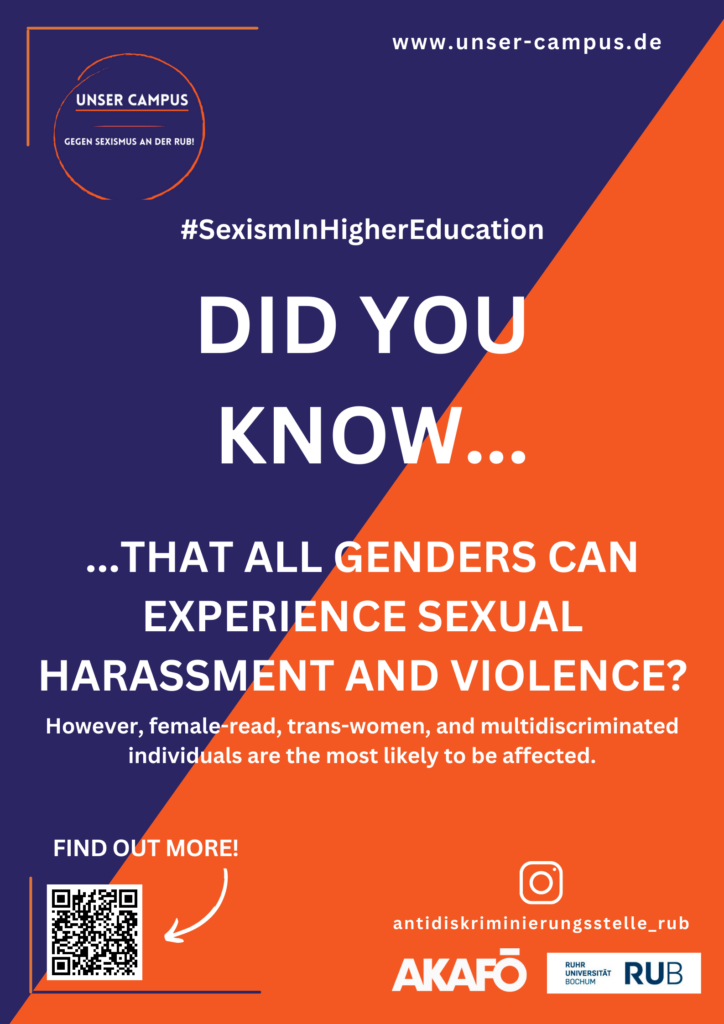
Maybe you have experienced something like this on campus? Someone shouts inappropriate comments about your appearance at you on the way to the underground. Or a professor tells you that you are worse at something than your fellow students because of your gender?
That is sexualised violence.
The Federal Ministry for Family Affairs, Women, Senior Citizens and Youth defines sexualised violence as any attack on sexual self-determination. It is not only about physical assaults, but about abuse of power. Unwanted sexual comments, gestures and messages also fall under it (1).
You are not alone. An EU study from 2022 shows that sexual violence is widespread in European universities. It affects 66% of students who identify as female, 74% of non-binary people, 68% of the LGBTQIA+ community and 56% of men* (2). TIN* (trans*, inter, non-binary) people are particularly affected (3) and queer people in general (2). Men* can also be victims, but are less likely to talk about it for fear of not being taken seriously or not being seen as „manly enough“ (Schlingmann, 2018). All genders are therefore affected by sexualised violence.
Unfortunately, only 13% of those affected report sexualised violence at university. The reasons for this are uncertainty about the seriousness of the situation and fear of negative effects on their studies or work (2).
Our campus stands against sexualised violence at the RUB
We find: Any form of sexualised violence on campus is unacceptable! The awareness campaign OUR CAMPUS – Against Sexism at RUB! aims to combat sexualised violence and sexism by educating and raising awareness – through workshops, events and online content on our website and on Instagram at @antidiskriminierungsstelle_rub. Together we make our campus a safe space for all!

Got curious?
Follow us on Instagram at @antidiscriminierungsstelle_rub and visit our blog to never miss any news and actions! We are also very happy to receive requests for cooperations and workshops.
Have you experienced sexualised violence or sexism at RUB yourself or are you not sure? Then you can contact the following contact points at any time:
If you are in an acutely dangerous situation on campus or you feel uncomfortable or unsafe, you can contact the RUB Control Centre at any time on this number: 0234/3223333.
The RUB Anti-Discrimination Office offers confidential and impartial individual counselling sessions on all forms of discrimination for all members of the Ruhr-Universität. Or write directly to antidiskriminierung@rub.de
Are you FINTA*?
Then you can contact the RUB Equal Opportunities Office or the Equal Opportunities Officer in your faculty. They will give you completely confidential advice. Or just write directly to gleichstellung@rub.de
The autonomous queerfeminist department regularly offers events and advice on the topic. You can also network with other FINTA* on campus.
Email: aqfr@rub.de
Instagram: @queerfeministreferatrub
You are queer?
The initiative Queer at the RUB offers opportunities for exchange and collects all important information for queer university members:
The autonomous gay* department is the central contact point for gay* students.
E-Mail: schwulenreferat@rub.de
In Bochum
Wildwasser e.V. is a counselling centre for victims of sexualised violence and for prevention work in Bochum. They advise and accompany those affected.
Rosa Strippe e.V. is the contact point for LGBTQIA+ persons in Bochum. Among other things, the association offers the possibility to report cases of violence directly to you online.
Throughout Germany
The helpline „Violence against women“ offers confidential and free help and support 365 days a year, around the clock, anonymously, in several languages and barrier-free throughout Germany on 08000 116 016 and via online counselling.
Men can also receive support and counselling by calling the „Violence against Men“ helpline on 0800 123 9900.
Sources:
- Bundesministerium für Familie, Frauen, Kinder und Senioren zu sexualisierter Gewalt.: https://www.bmfsfj.de/bmfsfj/themen/gleichstellung/frauen-vor-gewalt-schuetzen/haeusliche-gewalt/formen-der-gewalt-erkennen-80642 (aufgerufen am 15.09.2023)
- Informationsseite der Antidiskriminierungsstelle des Bundes über Trans*-Personen in Deutschland: https://www.antidiskriminierungsstelle.de/DE/ueber-diskriminierung/diskriminierungsmerkmale/geschlecht-und-geschlechtsidentitaet/trans/trans-node.html (aufgerufen am 11.09.2023)
- Lipinsky, A., Schredl, C., Baumann, H., Humbert, A., Tanwar, J. (2022). Gender-based violence and its consequences in European Academia, Summary results from the UniSAFE survey. Report, November 2022.
Further reading and information:
Retkowski, A., Treibel, A., & Tuider, E. (2018). Handbuch Sexualisierte Gewalt und pädagogische Kontexte: Theorie, Forschung, Praxis. Beltz Juventa.
Schlingmann, T. (2021). Sexualisierte Gewalt gegen Männer* Einordnungen und Kontexte. Jungen und Männer als Betroffene sexualisierter Gewalt, 103-131.
https://www.youtube.com/watch?v=oeanUbmAW38 (Talk zu sexualisierter Gewalt an Männern*
https://www.lsvd.de/de/ct/2445-Homophobe-Gewalt (Lesben und Schwulenverband zu homofeindlicher Gewalt)
https://www.gesis.org/cews/drittmittelprojekte/aktuelle-projekte/unisafe (Die EU UniSAFE-Studie)
https://www.transinterqueer.org/ (Fachstelle für TIN-Personen)

